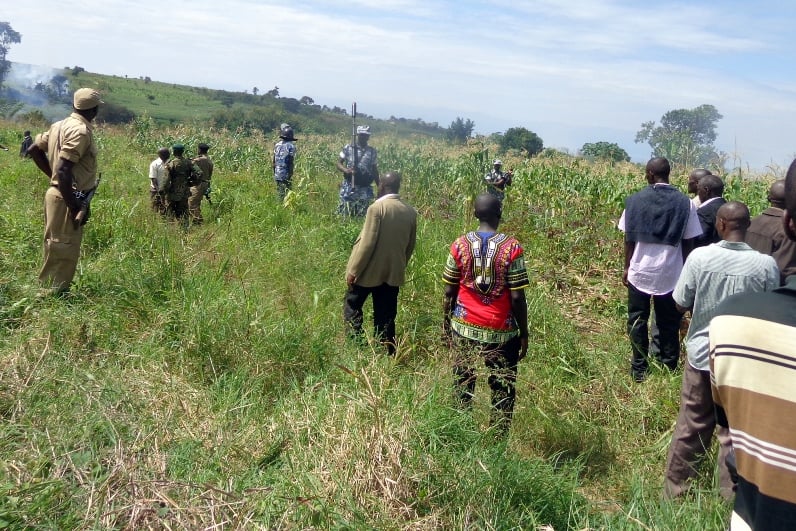Prime
The political crisis around land

Police officers and residents inspect a disputed piece of land. Disputes over land are tearing families apart. PHOTO/FILE
What you need to know:
- The impulse to accumulate square miles of land by military and government officials is the same impulse that people feel about their land being grabbed.
Last week, the High Court in Kampala ruled, in the case of Kasim Bagenda & Housing Finance Bank vs Ronald Ssenyonga that selling mailo land by bibanja holders or tenants without rendered consent of the landlord is illegal.
Although much discussion about it took place on radio stations, the ruling was confusing to many in the general public.
It was not clear if this was a ruling that will protect landlords or tenants. It was also not clear if at some point in the future, President Museveni will speak out on this ruling and criticise the High Court’s verdict.
None of this really matters, however.
As with most other things in Uganda today, land-grabbing is going on, especially in Buganda and Busoga sub-regions, soon to spread to Bunyoro as speculators and politically connected people await petroleum production.
Former Rubaga South MP John Ken Lukyamuzi stated last week on a local radio station that there are presently about 20,000 cases involving land disputes in the Ugandan court system.
Land. It represents the most solid reality. It is the very thing on which we walk and live. It is the final resting place for most in Africa.
It is the most existential of assets.
The impulse to accumulate square miles of land by military and government officials is the same impulse that people feel about their land being grabbed.
Disputes over land are tearing families apart.
If siblings, uncles, grandparents, and children can face each other in court during land disputes, how much more must the population feel bitterness toward government officials who grab it from them?
Even where land is not grabbed by politically influential people but is freely sold, the transaction is rooted in the general environment of political unfairness and economic inequality.
Desperate families or members of families sell off their rural land in order to pay school fees, buy a boda boda bike, or an air ticket to travel to the Middle East in search of work.
Those buying the land usually have obtained the money through the abuse of their official positions or through other illegal means.
It is on paper a free market transaction, but morally it is a one-sided deal.
More often than not, the cash from selling their rural land does not bring about the economic opportunities anticipated.
Disillusionment and frustration set in. This is why, in the first place, People Power and National Unity Platform (NUP) rose overnight from the slums of Kamwokya in Kampala into the largest Opposition party at their first general election effort.
The large crowds that turned up late last month during NUP president Robert Kyagulanyi, aka Bobi Wine’s, countrywide political tour suggest that NUP will gain even more traction in the 2026 election, especially now that the Forum for Democratic Change (FDC) has split up and left many of its members with nowhere else to go.
Many of the African independence movements were rooted in the question of land.
The Mau Mau, a Kikuyu guerrilla force, starting in 1952 with recovery of the fertile White Settlers’ land in the central highlands was the rallying call.
So was the Zanu-PF struggle of the 1960s and 1970s in Rhodesia (later Zimbabwe).
The recent rise in popularity of South Africa’s Economic Freedom Fighters (EFF) led by the firebrand Julius Malema is mainly due to the belated realisation by the Black majority that African National Congress (ANC) rule since 1994 has not addressed the question of land distribution.
Border disputes between Eritrea and Ethiopia and between Somalia and Ethiopia all show how sensitive the matter of land is.
Four years ago, bitter disputes over land in Amuru in northern Uganda made it to the national news.
People can put up with election rigging. People can be resigned to corruption and poor public services and infrastructure.
But the prospect of their ancestral land being grabbed fills them with a level of insecurity and anger that marks a decisive shift in their attitude toward the government.
Complacency is replaced by burning indignation and bitterness.





